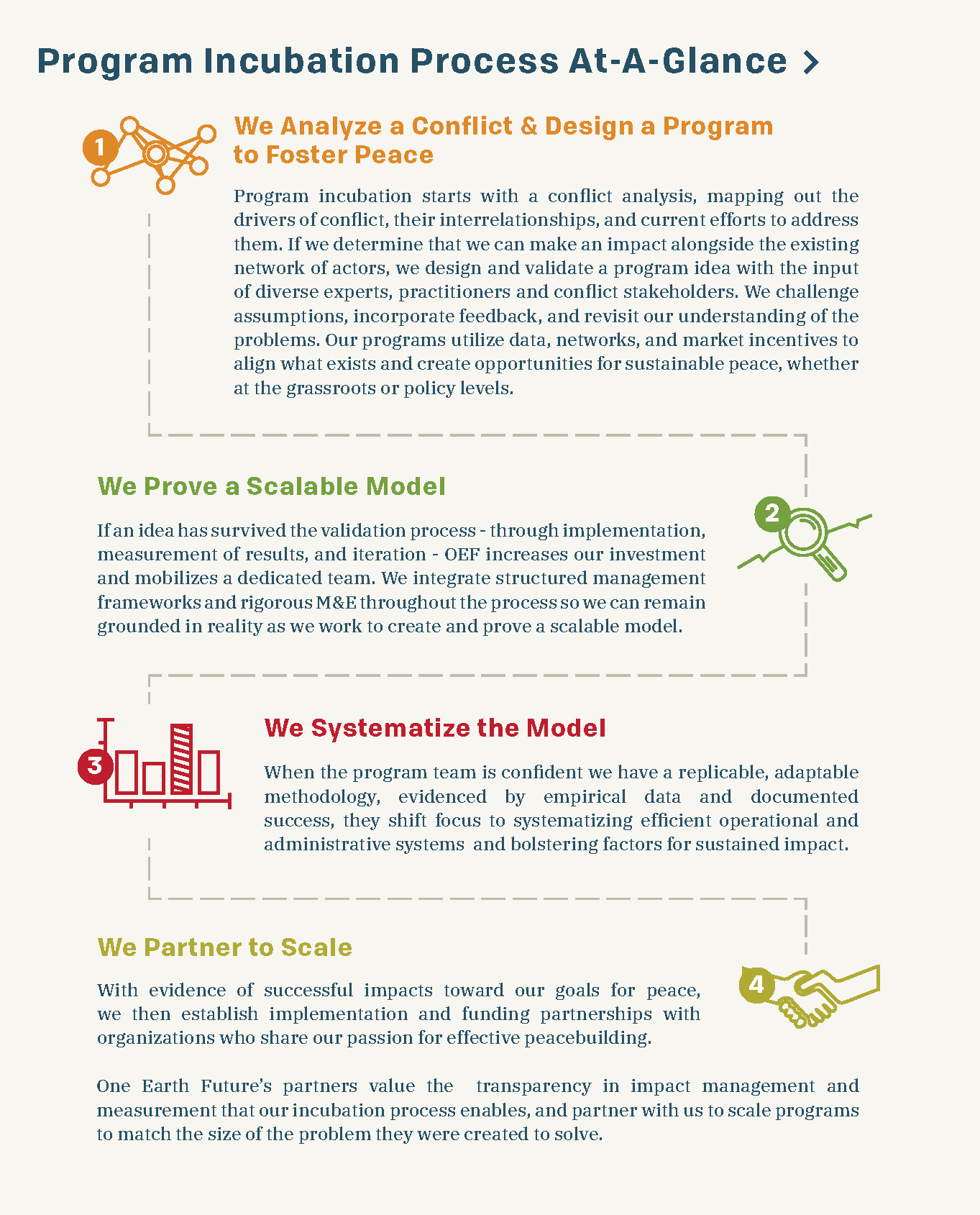At the heart of our endeavor, OEF is dedicated to discovering that which demonstrably resolves problems that lead to conflict between humans.
It is from this imperative that we operationalize programs, from ideation to design and through implementation. To achieve this, we operate within the logic of incubation. This means that we start small and narrow and iterate our way forward progressively as we gain correlating evidence about whether our approach is working. We provide the resources, time, and support needed for new programs to discover what works in a particular context. The peacebuilding field is increasingly confronting a gap between theory and practice. In principle, we know what sustainable peace looks like and we have a developing understanding of what it takes to get there. In practice, though, the field is still developing models to deliver the kind of complex, sustainable interventions that can address the roots of armed conflict. At One Earth Future, we have developed a standardized operating strategy to help us address this gap by helping us develop in a step-by-step manner systems that we believe are effective and scalable.
Our theories of impact are rooted in the recognition that sustainable peace requires addressing multiple aspects of the complex systems driving armed conflict simultaneously and at a scale sufficient to have a real impact on these systems.
These solutions have to be both bottom-up and top-down, as well as active across different conflict domains. Achieving this has required us to develop a methodical approach with a long-term–horizon, and one which recognizes that any transformational and long-lasting work towards peace must be contextually informed and applied with the needed scale and scope. Our strategy is rooted in part in the recognition that we as a single NGO can’t solve problems alone and must coordinate with other organizations to support collective impact. At the same time, we develop and execute programs designed to solve specific, discrete drivers of conflict. In executing these programs, we have developed frameworks used for planning, launching, refining, and scaling work that attempts to balance our mission, our limited resources, and our emphasis on working for sustainable and long-term solutions.
Our fundamental challenge is how to work at a scale sufficient for impact in a complexity-informed way.
How can projects be developed at the scale of the problem—an issue that requires significant resources and associated comprehensive administration—while also reflecting the complexity of conflict and the need to operate as part of a larger system? More importantly: what should be scaled? We know that sufficient scale is needed to shift the tides on wicked problems that hold humanity back, yet we also are humble enough to accept that we don’t have all the answers in our hands right now for what types of work will shift those tides—no one does. We believe that for impact to be truly effective and long-lasting it has to emerge out of the convergence of global best-practice and local realities. Our approach to incubation is borne of this recognition and of the imperative to develop a systematic approach that can enable the discovery and scaling of effective solutions.
Program Incubation Process At-A-Glance

OEF knows firsthand that building peace is hard.
Peacebuilding is, by its nature, complex, and it’s difficult for any single organization, especially an NGO, to play a determinative role. Solving problems at the root of armed conflict requires a complex web of interventions across multiple different issue areas and across all levels of society. Because we take seriously our mission to eliminate armed conflict, OEF develops tools that let us facilitate this web of interventions while also showing direct, material impact on specific problems. The intervention model we have developed is one approach to operationalizing this. We are an organization committed to learning, and as part of that, we recognize that our models will not work perfectly or indefinitely and will need to be updated. However, we believe that this is a valuable tool for building peace sustainably, and we hope that it is valuable to other peacebuilders encountering these questions.